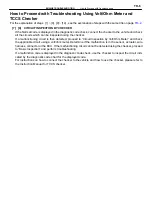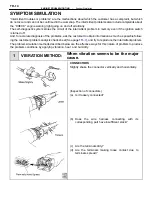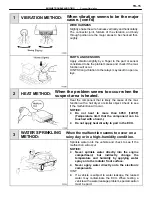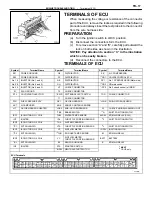
HOW TO PROCEED WITH TROUBLESHOOTING
The Engine Control System broadly consists of the sensors, ECU and actuators. The ECU receives signals from
various sensors, judges the operating conditions and determines the optimum injection duration, timing, ignition
timing and idle speed.
In general, the Engine Control System is considered to be a very intricate system to troubleshoot when it
occurred. But, the fact is that if you proceed to inspect the circuit one by one following the procedures directed
in this manual, troubleshooting of this system is not complex.
This section explains the most ideal method of troubleshooting and tells how to carry out the necessary repairs.
[1] CUSTOMER PROBLEM ANALYSIS
Using the customer problem analysis check sheet for reference, ask the customer in as much details as possible
about the problem.
[2]
DIAGNOSTIC CODE CHECK, DIAGNOSTIC CODE CLEARANCE
Before confirming the problem symptom, first check the diagnostic code and make a note of any malfunc-
tion code displayed, then clear the code.
HINT: Output of the malfunction code indicates that there is a malfunction in the circuit indicated.
However, it does not indicate whether the malfunction is still occurring or occured in the past but retured
to normal. In order to determine this, the problem symptoms should be confirmed in [3] and the diagnostic
code should be rechecked in [5].
Accordingly, if troubleshooting is begun based on the malfunction code only in the diagnostic code check
in 2, it could result in a misdiagnosis, leading to troubleshooting of normally operating circuits and making
it more difficult to locate the cause of the problem.
[3] PROBLEM SYMPTOM CONFIRMATION [4] SYMPTOM SIMULATION
Confirm the symptoms of the problem.
If the problem does not reappear, use the symptom simulation method to make sure the problem.
[5] DIAGNOSTIC CODE CHECK
Check the diagnostic code. If the malfunction code is output, proceed to step [6]. If the normal code is out-
put, proceed to step [7].
[6] DIAGNOSTIC CODE CHART
If the malfunction code is confirmed in the diagnostic code check, proceed to the check procedure indicated
by chart for each diagnostic code.
[7] BASIC INSPECTION
Carry out basic inspection such as the ignition spark check and fuel pressure check, etc.
[8] MATRIX CHART OF PROBLEM SYMPTOMS
If the problem is not confirmed in the basic inspection, perform troubleshooting according to the inspection
order in the matrix chart of problem symptoms.
[9] COMPONENTS INSPECTION
When the matrix chart of problem symptoms instructs to check the components, proceed to the compo-
nents inspection section included in this manual.
TR–2
–
ENGINE TROUBLESHOOTING
How to Proceed with Troubleshooting
Summary of Contents for 2VZ-FE
Page 1: ...ENGINE MECHANICAL EM 1 ENGINE MECHANICAL Description Operation ...
Page 31: ...CYLINDER HEADS COMPONENTS EM 29 ENGINE MECHANICAL Cylinder Heads ...
Page 63: ...CYLINDER BLOCK REMOVAL OF ENGINE EM 61 ENGINE MECHANICAL Cylinder Block ...
Page 64: ...EM 62 ENGINE MECHANICAL Cylinder Block ...
Page 71: ...COMPONENTS EM 69 ENGINE MECHANICAL Cylinder Block ...
Page 106: ...EFI SYSTEM FI 1 ...
Page 107: ...DESCRIPTION FI 2 EFI SYSTEM Description ...
Page 111: ...OPERATION System Circuit FI 4 EFI SYSTEM Operation System Circuit ...
Page 121: ...FUEL SYSTEM Fuel Pump EFI SYSTEM Fuel System Fuel Pump FI 15 ...
Page 141: ...Fuel Tank and Lines COMPONENTS EFI SYSTEM Fuel System Fuel Tank and Lines FI 35 ...
Page 172: ...EXHAUST SYSTEM EXHAUST SYSTEM REPAIR INSTRUCTIONS EX 1 ...
Page 174: ...EMISSION CONTROL SYSTEMS EC 1 ...
Page 186: ...COOLING SYSTEM CO 1 ...
Page 205: ...LUBRICATION SYSTEM LUBRICATION SYSTEM Description Operation LU 1 ...
Page 224: ...IGNITION SYSTEM IG 1 ...
Page 237: ...SERVICE SPECIFICATIONS IG 14 IGNITION SYSTEM ServiceSpecifications ...
Page 238: ...ENGINE TROUBLESHOOTING TR 1 ...
















































